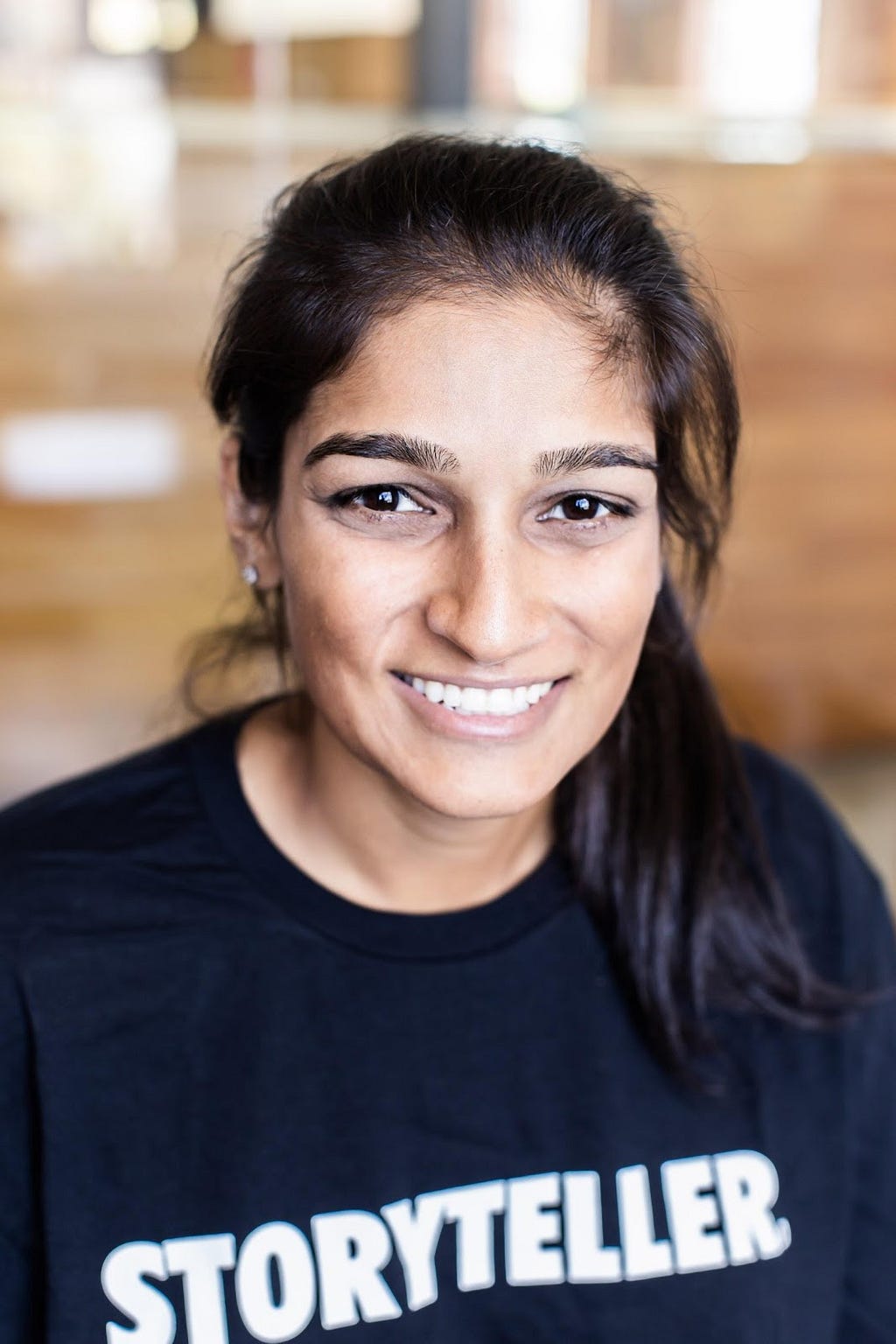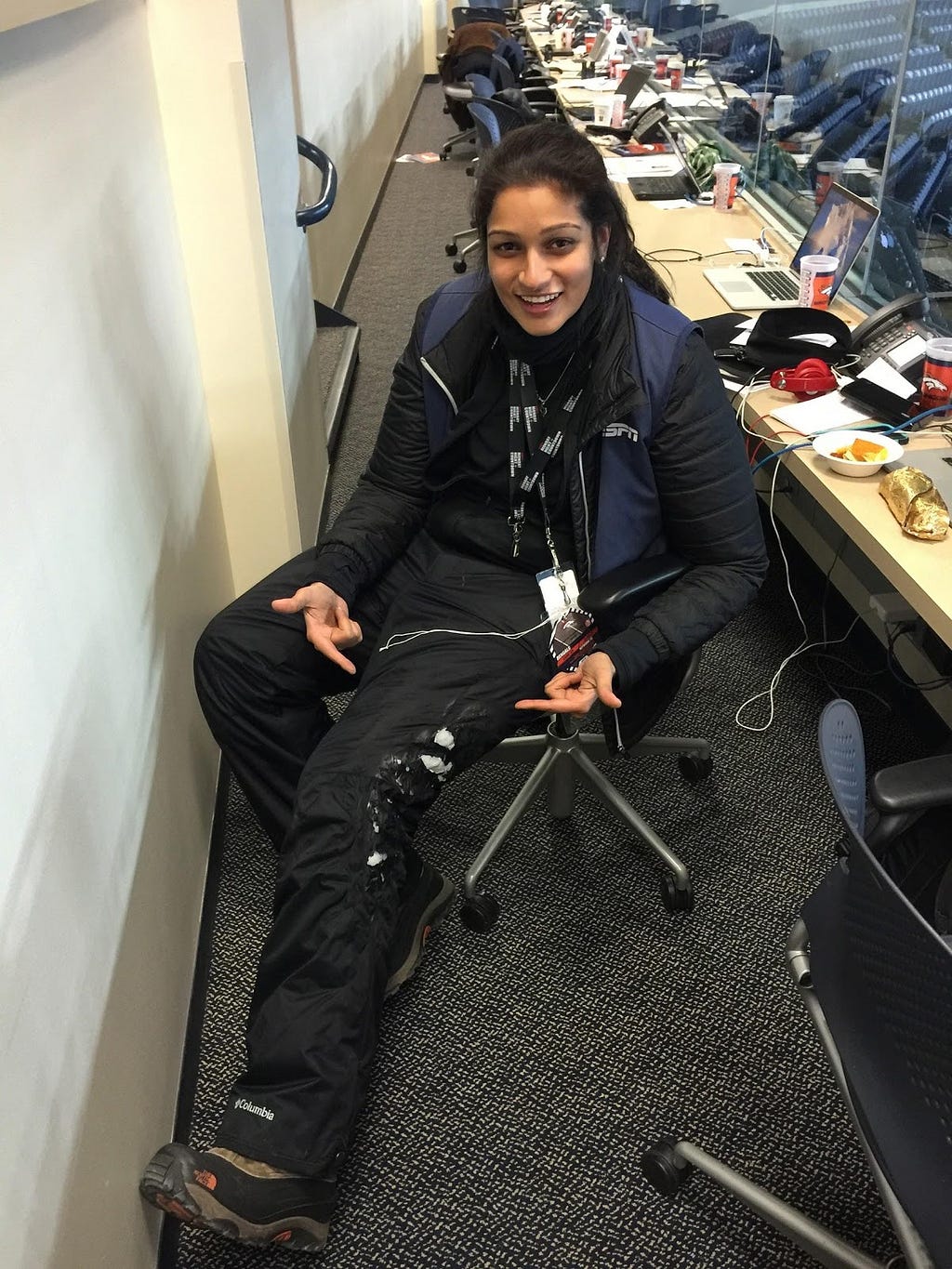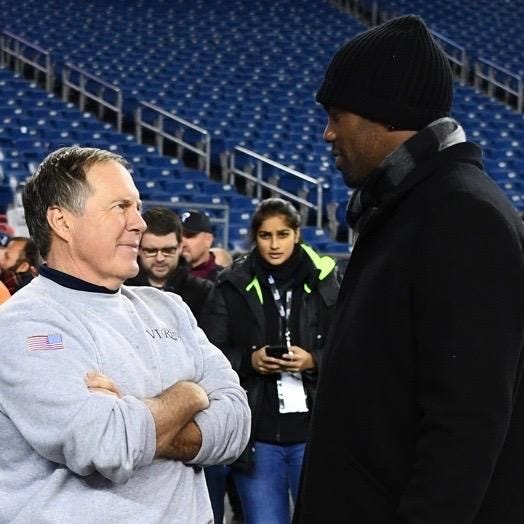
Create an engaged audience. There’s a lot of fake numbers in the digital space. The most important metric that matters is the engagement rate of your social accounts. If you have a million followers but there are two retweets, there’s a problem. Make sure you’re building an audience that is receptive to your content and taking actions on your content. On a case-by-case basis, it’s a good idea to be taking advantage of Q&As, tools, etc to interact with audience members (maybe a fan is having a bad day and there’s an opportunity for a cool interaction), but always be deliberate and make sure you’re having responsible interactions on social.
As part of my series about “How Influencers Can Monetize Their Brand” I had the pleasure of interviewing Neeta Sreekanth. Neeta holds the first newly created role of Chief Operating Officer at INFLCR, leading the company’s marketing, sales, client success, operations and athlete engagement departments. In this role, Neeta is focused on emerging markets, partnerships, strategic innovation and operational execution as INFLCR expand into a new era, employing creative innovation to continue building the company’s brand as the leading social media content delivery platform for sports.
Neeta joins INFLCR from IGN Entertainment, the leading internet media company focused on the video game and entertainment enthusiasts, where she was Head of Social Content and Strategy, overseeing relationships with social platforms, spearheading content partnerships, and driving social content strategy around key events. Prior to IGN Entertainment, Neeta was the Manager of Social media at ESPN, where she managed original content creation and strategy.
She has a background in sports as a former Division I college basketball player, later moving into early career positions with the Los Angeles Sparks, CBS, and the Dallas Cowboys. Neeta is now based in a newly opened Los Angeles satellite office and reports directly to Co-Founder & CEO, Jim Cavale.
Thank you so much for doing this with us Neeta! What is your “backstory”?
I grew up watching sports, being around it as a ball kid with the Dallas Mavericks and just falling in love with the game of basketball. I knew that I wanted to identify with that in the long run, in any way, shape, or form.
So, I grew up around sports, played sports, sports is what I know. Throughout my entire career, I’ve had some sort of footing in the sports and entertainment industry, and sports has been a consistent theme and a guiding force in my life.
Can you share the funniest or most interesting story that happened to you in the course of your career?
It has to be a story from my time at ESPN, I know the perfect one. December 28th, 2015, a Monday Night Football game between the Broncos and the Bengals, I was absolutely frozen out there. Probably one of the coldest games I’ve ever been a part of. I was on the Broncos sidelines shooting content for ESPN social (I had been at every Monday Night game that year), and at this point in the game, the players were running off the field for a second. It was so cold, they were going straight to the heater to warm up (a gas/propane heater) because every one of them was frozen.
One player runs up to the gauge to try and crank up the heat, and while doing so (even the knob had frozen because of the cold) he turned it and it broke off of the heater unit. The gas went, just, incredibly fast, and the fire that was powering the heater broke containment. I happened to be standing right near it on the sidelines, and it caught my entire left leg ON FIRE for a solid five seconds.
I actually didn’t notice it right away! I was bundled up in a lot of layers, but I was also just so cold! Plus I was paying a lot of attention to the game instead of the heater.
Two photographers happened to be nearby, noticed what had happened, and ran over and threw snow on my leg to put it out. I realized what was going on and took a knee to make sure the fire was totally out, and then got checked out by the ESPN medical staff (thankfully my layers helped to protect my leg, it was really just a little red).
I patched myself up and went and finished the game.

How have you used your success to bring goodness to the world?
I believe in “paying it back.” I feel like throughout my entire career, people have “paid it forward” to me. Along the journey to where I am now, I’ve always had mentors and teachers offering guidance and advice, helping me get to the next level. And so, even as I was working my way and gaining traction in the industry, which is something I’m still working on even today, I’ve always made it a point to offer my own time when people in my network reach out for some help.
Whether it’s reviewing a resume, helping to make an introduction to someone, hopping on the phone to chat for 10–15 minutes, I think it’s important that you give that kind of guidance to people who are in a similar position as I was a few years ago. That extra bit of help can be extremely valuable for others who are trying to get into an industry like sports, which is a particularly tough industry to crack.
If someone would want to emulate your career, what would you suggest are the most important things to do?
The most important first step is to distinguish yourself from other people in your space, and that comes down to three things: working harder, working smarter, and networking.
Working hard is about taking advantage of any time that you can put towards achieving your ultimate goal. So, when I was in college, I was playing basketball, I was going to class, doing internships. In the summer, when I wasn’t required to be at school, I was at internships. I was taking advantage of every moment.
After graduating, and when I joined the Dallas Cowboys, I was spending my own time (after leaving the office) reading and understanding the different tactics others were employing on social. I was really focusing on how I could outwork other people that were parallel to me when it came to an opportunity that was coming down the line.
Working smart really came down to understanding what my ultimate goal was, and I knew that I wanted to be in the social media industry. So, figuring out what things were most important at any role that I might want to pursue, and understanding what those employers or those hiring managers were looking for. And then making sure that I was making myself better at those skills, which ties back to working hard.
Not only was I making it a priority to use all of my time effectively to be ahead of my counterparts, but I was choosing what I worked on deliberately to be the most productive in the long run.
And then the networking piece, I had been blessed with a lot of really great mentors and opportunities that others haven’t had, and I wanted to take advantage of that fact by networking with every single person I came across during those specific times. That’s from my time as a ball kid with the Mavs, or my time at ESPN, which is where I built my entire Rolodex really. I always wanted to make sure that I was creating a relationship that lasted beyond whatever project we were working on, and I encourage others to take advantage of their own network to do the same.
Is there a particular person that made a profound difference in your life to whom you are grateful?
If I had to boil it down to one person, I think the first person who made an impression on me growing up was Jim Guy. He was the man who first gave me a chance as a ball kid with the Dallas Mavericks, I still keep in touch with him to this day. He showed me the discipline that it takes to work in sports, how tough it is, and he was always an ear to listen to any of the challenges I was facing.
Most importantly, he took me under his wing when he had no reason to, at such a young age. I learned a lot from him, and a lot of the mindset that I still have today comes from his (continued) mentorship.
Here’s a story about Jim.
Becoming a ball kid with the Dallas Mavericks meant going to their summer camps, and completing a rigorous application. 1000 people applied, and I think it was maybe 80 people who were ultimately selected. I went in to the Mavericks basketball camp, not knowing anyone at all at the camp, I just signed up because I loved basketball and the Mavericks and wanted to participate.
Jim ran the youth basketball camps, he did stats, and he ran the ball kid operation. He would come in and coach players, and I just showed up and played really well every day at this camp. Jim noticed me because of my play on the court, but more importantly (he told me after the fact) that he loved my attitude. And really from the outset, given that he barely knew me, Jim had me in the demonstrations at camp. He was the one who taught me that just because I’m tall doesn’t mean I need to stay down low and play post or play center. He’s the one who told me to face the basket, and shoots, and to wear the number 41 as a reference to basketball great, Dirk Nowitzki. If it wasn’t for Jim, not only would I not have had the opportunities provided by the Dallas Mavericks’ ball kid program, but my on-the-court game would be completely different. If he hadn’t given me the confidence to square up, dribble, shoot from distance, and play more like #41, my entire basketball career and life might have been different.
Can you share a story?
Here’s another story from my time at ESPN, this time it was 2017. Dolphins vs. Patriots, Bill Belichick, Tom Brady, Monday Night Football, in Miami. Before the game started, Bill Belichick (known to be a very serious person in general) enters the field, and the first thing he does is actually make a beeline for the ESPN set to find Randy Moss.
Randy was covering the game (I think it was his 2nd time actually commentating at a Patriots game). Bill finds Randy, and instead of just talking to him and saying something casual like “Hey, how’s it going,” he says “You’re one of the best two players I’ve ever coached. It was you and L.T.”
And, seeing that kind of respect that Belichick had for Randy Moss, given that Bill was about to play a very important game, really motivated me to be as good at my own craft as possible, to where some of the most respected people in the industry would talk to me in the same way.
I saw something really special: it was probably one of the coolest things I’ve ever seen. The amount of respect that the best coach in NFL history had for, arguably, the best wide receiver in NFL history just helps put into perspective that there’s more to sports than what happens on the field. I just hope to one day have my own legacy (in the context of my profession) reflect even a percentage point of that powerful interaction.

So what are the most exciting projects you are working on now?
The most exciting project I’m working on now is figuring out how INFLCR as a platform can help athletes monetize their name, image, and likeness. Being at the forefront of a very exciting future in college sports is an incredibly powerful opportunity and a project that I am not taking for granted.
What are your “Top Five Ideas About How Influencers Can Monetize Their Brand”. (Please share a story or example for each.)
First, grow your social distribution.
Whatever platforms you’re on, make sure you have a strategy in place to grow those distribution points in the most organic way possible. That means putting together a content strategy for each of those distribution points and growing your brand in the most responsible way possible. The higher the distribution, the more you can monetize and get paid to advertise through your channels.
Next, create your own unique voice or personality.
Answer this: “why should brands spend with you?” This boils down to the character you have (and bring) to your social voice, personal brand, and any other media where you are represented. It’s important to have that voice because brands want to make sure they’re aligning with someone who isn’t a robot.
Third, maintain relevance.
In this day in age, brands want to spend with influencers that are relevant. If you’re not relevant, you’re not getting a penny. For example, an athlete stays relevant by performing at the best of their abilities on the court and engaging their community responsibly off the court. Same for the entertainment world, except they might be performing at their best on-screen. Very important: stay out of trouble.
Fourth, create an engaged audience.
There’s a lot of fake numbers in the digital space. The most important metric that matters is the engagement rate of your social accounts. If you have a million followers but there are two retweets, there’s a problem. Make sure you’re building an audience that is receptive to your content and taking actions on your content.
On a case-by-case basis, it’s a good idea to be taking advantage of Q&As, tools, etc to interact with audience members (maybe a fan is having a bad day and there’s an opportunity for a cool interaction), but always be deliberate and make sure you’re having responsible interactions on social.
Finally, have a clear understanding (and sellable pitch) of who you are.
1–4 basically summarize and add up to #5. The key is to make sure that all of your channels, engaged audience successes and metrics are communicated clearly to brands and vendors so they see the power you bring to the table and want to continue spending more.
Here’s a story: in a previous role of mine, we were looking at influencers as places of distribution. And I went away from looking at people that had a million, two million followers, and I looked specifically at their engaged audience. You could have 200,000 followers and have a more engaged audience than someone with a way higher following. Having a clear idea and clear numbers around the engagement that your audience has with your content is powerful and must be communicated to brands.
We are very blessed that some of the biggest names in Business, VC funding, Sports, and Entertainment read this column. Is there a person in the world, or in the US whom you would love to have a private breakfast or lunch with, and why? He or she might just see this. 🙂
I have two! Mark Cuban, or Elon Musk.
Elon is one of the most brilliant minds of our generation. His innovation when it comes to technology, specifically in regards to Tesla, has changed the way we view the electric vehicle and disrupted that whole industry.
When it comes to Mark Cuban, he has made a lot of investments, but he’s also been through it all. He’s seen success, he’s seen failures, he’s learned from his failures. Every time I hear him speak I recognize that he has a lot of knowledge to impart, and I feel like saying two words and letting him just unleash on a conversation is something I would truly value from an education standpoint.
What is the best way our readers can follow you on social media?
Twitter: https://twitter.com/neetasreekanth
Instagram: https://www.instagram.com/neetasreekanth
LinkedIn: https://www.linkedin.com/in/neetasreekanth/
5 Ways For Influencers To Monetize Their Brand, With Neeta Sreekanth of INFLCR was originally published in Authority Magazine on Medium, where people are continuing the conversation by highlighting and responding to this story.

